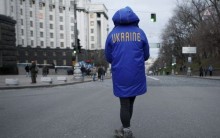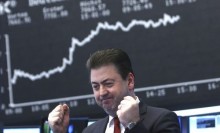What will happen to Ukraine after it burns through 15 billion dollars of Russian bailout loans? Will the Ukrainian economy become stronger by that time? Will it crawl back from the brink? Can the patient even be operated on? And where is its “resuscitation kit”? Answers to these questions affect now resolution of many sensitive issues, both political and geopolitical. As president of the Kyiv School of Economics Pavlo Sheremeta commented below, quantity of money in one’s pockets influences one’s position at the negotiating table...
International economic community joined Ukrainian experts to try and answer these questions at the first mini-Davos event held in Kyiv in November 2013, on the initiative of the president of Ukraine and funded by companies belonging to two of our oligarchs, Vadym Novynsky and Dmytro Firtash. However, these questions were put in a slightly different context then, as the prospect of the European Association Agreement for Ukraine loomed, while Russia, which was hitting this or that Ukrainian industry literally on the monthly basis, looked more hostile than reassuring.
The Day participated in the Kyiv mini-Davos. Under the rules set by the organizers, we were unable to publish its results, while the conference’s resolution was to include three development scenarios for Ukraine. Therefore, we prepared scenarios of our own, based on what we have heard or seen behind the scenes and from the stand alike. Our final article about it, entitled “Roshen Chocolates Lacking. Why?” was published in The Day on November 7, 2013.
We have less than 10 days left before we will learn how our guesswork compares with real scenarios. The Annual Economic Forum in Davos’s Ukrainian forecast session will be launched on January 24. Interestingly, the Russian forecast session will work in the same venue on January 23. Overall topic of this year’s meeting will be “The Reshaping of the World: Consequences for Society, Politics and Business.” The 44th Davos Forum will focus on healthcare and medicine issues, covering both social and economic aspects.
The Day will closely monitor the progress of work in this session. The day before, we contacted our experts who were going to attend Davos. They shared with us what questions and ideas they are bringing to Switzerland.
However, Davos’s Ukrainian context had some surprises appearing even before the forum’s launch. Recently, journalist and deputy editor-in-chief of Ukrainska Pravda Serhii Leshchenko published information that Viktor Pinchuk had cancelled his traditional reception, which for nine years involved statespersons and business elite from around the world meeting in an informal setting to have lunch and discuss key economic and political issues. The journalist gives as the official reason for cancellation the fact that Ukraine will be discussed in the forum’s main venue, so Pinchuk-sponsored event would overshadow it. But still, there was no information about the lunch cancellation and reasons for it on the Pinchuk Foundation’s official website on January 14, so The Day called the foundation’s press office and asked for a link to the news, only to be told: “Send a request for information.” We repeated the request by E-mail, again to no avail, and then called once more asking for just a yes-or-no answer to the question about the cancellation. The girl on the phone reported that she had passed our request to the foundation’s chief press officer, who had been at a meeting and unable to respond, and he would contact us later at the phone number given in the E-mail message. Of course, nobody called us by the end of the day.
So we had to take a different path, and ask the people who took part in previous Pinchuk lunches, whether they received an invitation this year, and if not, did they know what reasons were for the reception’s cancellation? Director of the International Center for Policy Studies Vira Nanivska response was as follows: “The reason was the Ukrainian lunch not meeting its targets. It was a costly event, staged to get some publicity and influence. He did it to get from the talk what could not be achieved by other means. When it fails to do so... Especially after past year’s expressions of dissatisfaction with this lunch...”
For his part, Leshchenko suggests that Pinchuk was just afraid that the lunch’s participants will berate Ukrainian authorities.
The Day’s journalists noticed Pinchuk’s removal from the Davos Forum’s organizing team back during the abovementioned mini-Davos in Kyiv, when he was not seen on the list of those who funded the event. “Given the fact that, as Viktor Yanukovych noted in his opening statement, the president was ‘personally overseeing preparations for the mini-Davos in Kyiv,’ could it be a sign of business lobby reformatting taking place in the current government? Also, is not entirely clear whether Pinchuk has been completely removed from the Davos Forum’s organizing team, or he will still hold his traditional lunches in Switzerland?” were our report’s final words.









